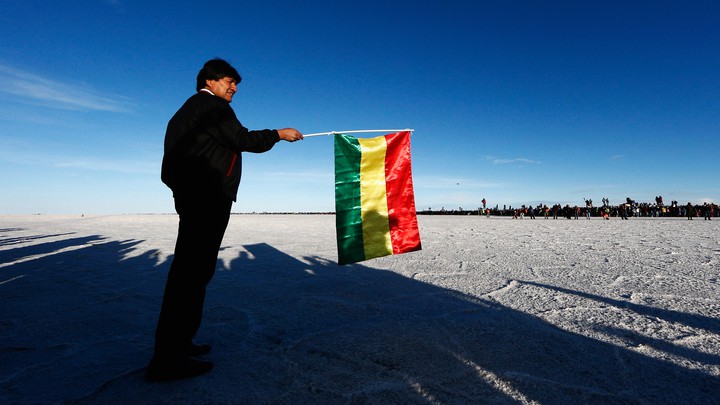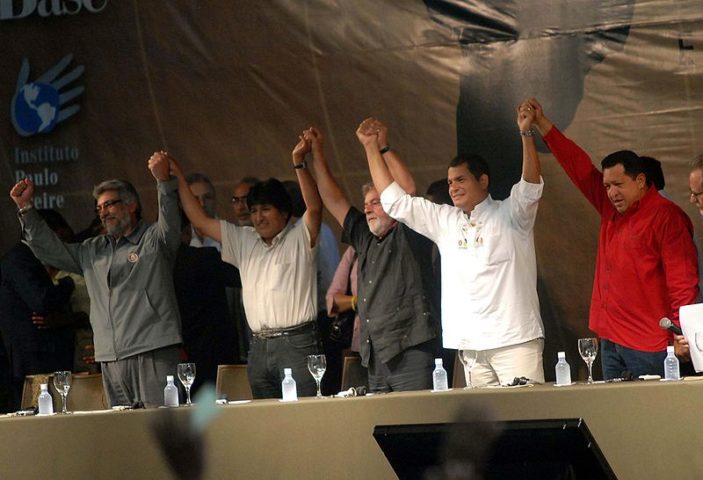The danger of the resurgence of communism in Bolivia and the return of Evo Morales by year of 2021.

During day 8 of the Dakar Rally on the Salar de Uyuni or Uyuni Salt Flats on January 11, 2015 in Uyuni, Bolivia.
************
The danger of the resurgence of communism in Bolivia and the return of Evo Morales by year of 2021.
“Evo Morales finally went too far for Bolivia. The socialist president claimed authoritarian powers in the name of the popular will. But average citizens were fed up with arbitrary rule.
President of Bolivia Evo Morales has been attacking Bolivia’s democracy for many years. Since coming to office in 2006, the socialist communist president did concentrate, before his departure from Bolivia, ever more authority in his own hands, denounced the opposition in aggressive terms, and placed loyalists in key institutions, from the country’s public broadcaster to its highest branch of government.
The Evo Morales’ government moved Bolivia towards a mixed socialist economy, to reduce its dependence on the World Bank and the International Monetary Fund and achieved some economic growth. Until he changed his course starting, reducing and attacking trade with the United States; he began relations with the leftist communist governments in the so-called “Latin American Communist Pink [Red] Tide”, especially close relations with Venezuela of Hugo Chávez and Cuba of Fidel Castro. Likewise, Evo Morales signed Bolivia in the “Bolivarian Alliance for the Americas” in order to have a communist socialism government, only achieving more poverty, crimes and finally brutal repressions on those who called for democracy.
Like many populists on both the left and the right, Evo Morales claimed to wield power in the name of the people. But after weeks of mass protests in La Paz and other Bolivian cities, and the rapid crumbling of his support both within law enforcement and his own political party, it was his loss of legitimacy among the majority of his own countrymen that forced Evo Morales to resign.
Proving that Bolivians, like the citizens of many other countries around the world, resent arbitrary rule, socialism communism. The longer they have suffered from oppression, the more they have come to value the democratic institutions that are now threatened again by populists en Bolivia and around the globe.
As Evo Morales started to come up against the two-term limit for presidents stipulated by the Bolivia’s Constitution he himself had championed in 2009, his enmity toward any semblance of the rule of law became more and more evident. In 2016, he held a binding referendum that would allow him to stay in office indefinitely similar to Fidel Castro in Cuba. When a majority of Bolivians voted down against the proposal, Evo Morales resorted to his tight control of previously independent institutions to get his way. In 2017, the country’s supreme court ruled that limits on the length of his tenure in office would violate Evo Morales’s human rights.
Thanks to this bizarre ruling, Evo Morales was able to run for yet another term in office. To secure his reelection in the first round of the elections, he needed to either win a majority of the vote, or lead his closest challenger by at least 10 percent. As the night wore on, and the state’s official electoral commission updated results in real time, it became more and more clear that he would fall far short of that goal.
That’s when the vote tally suddenly froze. For 24 hours, the website of Bolivia’s electoral commission offered no more updates.
Then the fake official result was finally announced: Morales had supposedly won 47.1 percent to Carlos Mesa’s 35.5 percent, winning the election outright.
The strong circumstantial evidence of vote tampering succeeded in inspiring what years of more subtle attacks on democratic institutions had failed to do: Millions of Bolivians went out into the streets to demand a fair election.
They all were threatened and beaten by Evo Morales pro-government gangs some criminals. Yet the public mood steadily swung against Evo Morales. Parts of Bolivia’s police and military made clear that they would no longer be willing to do his violent bidding.
When an independent observer mission from the Organization of American States published its audit of the election, the game was finally up. After the OAS announced that there had been “clear manipulations” of the vote in a scathing report, Evo Morales agreed to new elections. A few hours later, as scores of his own allies started to abandon the sinking Morales, he resigned from office. Though the future of Bolivian democracy still remains radically uncertain, this is a momentous turning point: one of the first times in recent memory that an authoritarian populist communist in America has been forced to vacate his office, because his own compatriots would not stand for his abuses.
Evo Morales’s departure from office marks both a sea change in Latin American politics and a stinging rebuke to the naïveté of parts of the Western left. Even though there had always been strong evidence of their anti-democratic leanings, new socialist communist leaders such as Hugo Chávez, and now Nicolas Maduro, in Venezuela and Evo Morales in Bolivia were widely celebrated throughout the first decade of the 21st century as the future face of Latin America.
Now virtually nothing remains of their erstwhile appeal. Chávez and his successor, Nicolás Maduro, have made Venezuela deeply authoritarian and shockingly poor. Nicolás Maduro Moros and 14 current and former Venezuelan Officials charged with Narco-Terrorism, Corruption, Drug Trafficking and other criminal charges
Maduro and other high ranking Venezuelan Officials allegedly partnered with the FARC to use cocaine as a weapon to “Flood” according to the United States Department of Justice, March 2020.
Before Evo Morales’ resignation, the Bolivian people had come out in great numbers to stop Morales from violently crushing their protests. As one of the most famous slogans of the Latin American left holds, “El pueblo unido jamás será vencido”: The people united will never be defeated.
From east to west, and south to north, the dream of Latin America’s so-called pink [red] wave has turned into a nightmare. And the many scholars, writers, and politicians who had have for years sung the praises of aspiring dictators like Nicolas Maduro and Evo Morales should not be easily forgiven for sacrificing the rights of distant people on the altar of their rigid socialist communist ideology.
Evo Morales’s resignation comes during a season of protest. From Beirut to Paris, and from Santiago to Hong Kong, millions of people have been taking to the streets to hold their governments accountable. It would be tempting, or assuring, to believe that all of these mass movements are caused by the same factors, and aim for the same goals.
There certainly are some important commonalities. In every case, protesters have come to believe that the powerful are insufficiently responsive to their demands and are ignorant of their desires. And in every case, they have made use of the ample opportunity for mass mobilization created by social networks from Facebook to WhatsApp. And yet, the hidden differences between these protest movements are ultimately more important than their obvious similarities.
One set of protesters, such as the striking students in Chile and the gilets jaunes in France, is expressing discontent with democratic governments. This group demonstrates that, in at least one important respect, the political scientist Francis Fukuyama was too optimistic in his famous thesis about the end of history. Liberal democracy, he asserted in 1989, would be the final form by which advanced human societies governed themselves, largely because they were uniquely able to manage their “internal contradictions.” Recent years show that he was overly sanguine about democracy’s stability. As the huge crowds in Paris and Santiago demonstrate, many democracies are struggling mightily to stop their internal contradictions from blowing up the system.
In many countries, a mixture of economic stagnation, growing inequality, and rapid cultural change has made a large number of citizens deeply skeptical about their democratic institutions. Whether or not the protests in Paris and Santiago will ultimately find expression in party politics, the forces that fuel them are similar to those that have swept a wave of populist politicians into office from Brazil to Mexico, and from Italy to the United States.
Another set of protesters, by contrast, stands at a much later stage in the struggle between democracy and autocracy. The citizens who have come out in great numbers in Caracas and La Paz, and even those who are starting to push back against their autocratic governments in Budapest and Istanbul, are not at all disenchanted with the shortcomings of democratic institutions. Quite the opposite: As they start to see their democratic rights and freedoms threatened in their daily lives, they are more and more determined to win them back.
This shows that Fukuyama’s much-maligned thesis may contain rather more wisdom than many now believe. While liberal democracy has proved much more fragile than most social scientists assumed a few short years ago, an alternative political system that would better resolve its own internal contradictions is not in sight. While populists on both the left and the right have been shockingly skillful at undermining democratic systems with the false promise of returning power to the people, their authoritarian instincts ultimately turn huge swaths of the population against them. The core values of liberal democracy—individual freedom and collective self-determination—may be more universal than recent setbacks seem to suggest.
Yaschla Mounck a writer of “The Atlantic, also he is the author of “The People vs. Democracy” wrote all this saying that, He was writing these lines in Prague, where he was speaking at an event commemorating the 30th anniversary of the fall of the Berlin Wall and of Czechoslovakia’s Velvet Revolution. The mood among the distinguished participants, many of whom played leading roles in toppling the Communist regime here, has been strikingly somber: While Central Europe seemed to be confidently marching toward a democratic future until just a few short years ago, populists are now threatening the survival of democratic institutions in many countries across the Continent.
This wave of progress and enthusiasm for the new democracy in Bolivia is now in jeopardy threatening to begin to recede. Between 2019 and 2020, the return of Evo Morales to power in Bolivia becomes increasingly evident with the help provided by socialist communist countries which range from China, Russia, to Cuba, Venezuela and Nicaragua with an increase to 100 percent, this could put liberty and democracy in Bolivia in checkmate, likewise puts Evo Morales’ detractors in danger of life or death, all those who exercised their power and knowledge for the departure of Evo Morales from Bolivia, as is in the case of the activist lawyer of Human Rights, Dr. Romer F. Villarroel Hurtado and his family today residing in United States.”

Humphrey Humber Pachecker
Commissioner General for Human Rights Commission
AICAC-HR Court, Washington, D.C.
